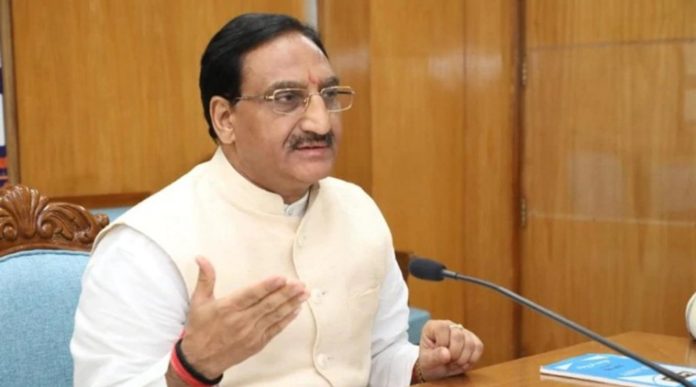New Delhi (NVI): The Central government aims to ensure quality education in India so that students studying in various foreign universities are able to get similar facilities here, Union Minister Ramesh Pokhriyal ‘Nishank’ said.
The Education Minister Pokhriyal said, “There are almost 8 lakh Indian students studying in various foreign universities and they spend on an average Rs 2 lakh crore every year in fees and other expenses. The government is taking steps to ensure that quality education and similar facilities are provided in India itself so that these students are retained here.”
He was speaking at the 14th NATIONAL EDUCATION SUMMIT 2021 – NEP 2020 – ‘Transforming Educational Landscape of the Nation and Carving a Road Map for Implementation’ organized by The Associated Chambers of Commerce and Industry of India (ASSOCHAM).
The minister said that that the education ministry is in talks with more than 128 foreign universities on ways to collaborate so that similar facilities can be given to the students here as well.
“We have already got more than 50000 student registrations and there are already almost 1000 students involved in research and development in India,” he added.
The education minister further said, “The Government of India has ensured that even during the lockdown, none of the students lost an academic year due to the non-accessibility of academic facilities.”
“Almost 33 crore students across the country were able to get online education. Even in remote villages, the education institutes ensured that students could get access to their studies through radios and rooftop loudspeakers,” he said.
Speaking on the New Education Policy (NEP) 2020, the minister explained that till class 5, students would be able to get an education in their mother tongue or the language of their preference.
“The Education facilities in India would get a huge boost with the introduction of the NEP. This would also help in the promotion of Local languages for education,” he added.
During his address at the summit, he asked the Industry representative to collaborate with educational institutes to help design the curriculum.
“Education is the most important pillar for any economy. Once the industries collaborate with the educational institutes, the curriculum can be designed in a way where the students can also gain industrial experience as a part of their studies,” he informed.
Meanwhile, Professor Ashutosh Sharma, Secretary, Department of Science & Technology (DST) explains that the education system should be designed as a means of achieving creativity and skill development.
“NEP 2020 aims to achieve that. The education curriculum should be aligned with the needs of the industry. Its objective should be to help in problem-solving of the society,” he said.
Dr Prashant Bhalla, Chairman, ASSOCHAM National Council on Education, explained that teaching students in the mother tongue will be very effective. “There are various studies that suggest that most students understand complex subjects when explained in their mother tongue. This would help many students,” he said.
The Union cabinet in July 2020, approved the New Education Policy (NEP), which aims at universalization of education from pre-school to secondary level.
NEP-2020, which replaced the National Policy on Education-1986, is an inclusive framework focusing on the elementary-level of education to higher education in the country.
-CHK








